Photographs: Pagalguy.com Bansi Mehta
A set of 'uncertified' managers in Ralegan Siddhi, social activitist Anna Hazare's hometown, have been giving management lessons to many B-school students and corporate employees over the years. Read on to find out how they are doing it.
Ralegan Siddhi, better known as Anna Hazare's hometown, has been for the past one decade frequented by thousands of students to learn about its development activities.
PaGaLGuY visited the village in search of these 'uncertified' managers who have been giving management lessons to many b-school students and corporate employees.
A role model
Dinesh Patil, former Principal of National Training Centre for Watershed Management (NTCWM), Ralegan Siddhi said, "Our village is a perfect example for management students to learn principles that can be applied in their course."
He further said that for the last three years he has been accompanying management students from various states to guide them about the development in the village.
"Students from the National Institute of Rural Management (NIRM), Hyderabad have been visiting the village for many years," he said. He went on to say that the village provided them with live examples about watershed management, diary management, study on co-operative banks and self-help groups, etc.
Nirja Matto, Chairperson, Center for Development of Corporate Citizenship (DOCC), SP Jain Institute of Management and Research (SPJIMR), Mumbai said, "We have been sending our students to Ralegan Siddhi to learn how adversity can be turned into an opportunity. The village indeed is an example of how innovation can take place at the grass-root level and can be turned around for larger good."
She also said that it was ironical that non-certified managers (villagers) guide students about leadership and problem solutions.
Anna has been successful in creating like-minded leaders in his village
Image: Anna Hazare's supporters in Ralegan SidhhiPhotographs: Sanjay Sawant/Rediff.com
The Backdrop
The village is situated about 87 km from Pune, and falls under the acute drought-prone and rain-shadow zone of Parner Tehsil, Ahmednagar.
For the villagers, the Anna phenomenon for the Jan LokPal Bill is fairly new since his prime motive for his village has been self reliance and sustainable development.
A research paper authored in September 2008 by Aasha Kapur Mehta and Trishna Satpathy, who work for Chronic Poverty Research Centre, Indian Institute of Public Administration (IIPA), states that by Indian standards, Ralegan Siddhi is a rich village now.
A recipient of more than 650 awards, both national and international, Anna has been successful in creating like-minded leaders in his village who have been running various departments efficiently.
The village has been transformed by taking into consideration all the sectors, most important being the Integrated Watershed Development Project (IWDP), education department, banking and loan sector, community and social sector. The village has a Sarpanch, under whom the Gram Panchayat and various societies function.
The Gram Panchayat has four most important mandals or groups -- Dharmik Mandal (religion), Tarun Mandal (youth), Mahila Mandal (women) and Shiksha Prasarak Mandal (education).
Pani Puravatha (IWD) and Vividh Karyakari (general) fall under societies. It is due to the overall change in the social, economic and cultural parameters that Ralegan Siddhi has become a place of learning for many management institutions.
Following are the management take-aways from the 'uncertified' managers of Ralegan Siddhi.
Team Work: Watershed Management Project
Image: Thakaram Lakshman RautPhotographs: Pagalguy.com
A 68-year-old Thakaram Lakshman Raut, manager at NTCWM and one of the trustees of the Hind Swaraj Trust (HST), has spent more than three decades managing various sectoral developments in Ralegan Siddhi. Having pursued a degree in MSc, he is passionate to work for the betterment of the village.
A former principal of the secondary school of the village, he is currently a watershed development trainer in Ralegan Siddhi. Originally hailing from a small town of Karjat in Ahmednagar district, Raut a close friend and aid of Anna, has seen the barren lands of Ralegan Siddhi turning into lush green.
"I have spent the most significant part of my life looking forward to the day when farmers do not have to wait for monsoon to water their fields," he said. He also informed that the Social Institute of Ralegan Siddhi and implementation of the IWDP along with the support of villagers had brought the water revolution in the village.
The IWDP team, headed by Raut, has more than 25 villagers who have implemented well and canal lift irrigation, drip irrigation, nalla bunding, contour bunding, percolation tanks, etc. Many of the team members are from the engineering background. "Our biggest challenge was to retain water for which we created bunds and percolation tanks," Raut added.
When asked about how does he manages his team without having a formal education background in understanding the dynamics of water resource management, he replied, "I had seen my family and villagers crave for sufficient supply of water. There is no degree required to generate a will to work for your people and community. Team effort and like-minded people will make success follow your footsteps. However, if given an opportunity to study formally in the field, I would love to take up those subjects and implement it for the betterment of the village."
According to state government reports, after the incorporation of integrated WDP, the village has around 50 nalla bunds, 50 borewells, seven co-operative wells and two percolation tanks. Also, land under irrigation has increased three times.
Take-away: The project helped to learn management of resources for rural livelihoods, mobilisation of scarce resources, innovation and scaled up techniques. It also made people understand integrated farming, water budgeting and joint forest management techniques.
'There is a different satisfaction involved when something concrete is done for societal good'
Image: Image used for representation purpose onlyPhotographs: Careers360
Annasaheb Rambhau Kale, 56, Principal of secondary school Shri Sant Yadababa Shikshan Prasarak Mandal (SSYSPM) in Ralegan Siddhi, stresses on field learning than classroom learning.
An MA in Hindi, he is an ardent follower of Anna. Hailing from Ranjangaon Tehsil, a few kilometers from Parner, Kale is painting Anna's vision of development amongst children.
SSYSPM is an outcome of Shramdan, an act of benevolence devised by Anna that involves participation of villagers without getting anything in return. "I have trained more than 10,000 school students in the past one decade. Most of them have become engineers and have started their small enterprises. Our mission is to provide skills and teach values that will guide a child all through his life," a visibly proud Kale said.
SSYSPM provides education from Class V to XII and works on five principles (Panchsutri) namely physical fitness, character building, service for country and community, hard work and intelligence. The school also has an Information Technology (IT) laboratory.
"At least one male member of each of the 250 odd families in the village, is in the forces. Because of our rigorous fitness training at an early age, our students easily clear the fitness test in the military admission process," he said.
The village also has a hostel for poor students who are from various parts of Maharashtra and priority is given to students who have a record of failure or involvement in anti-social behaviour.
"I have a team of about thirty people including teachers, administration staff, etc who help me manage the institution. Also, special attention is given to tasks, wherein students are made to participate in village activities and development projects," Kale informed.
"There are students who are MBA aspirants, some want to have their own business, but I always remind them that life is not about profit, there is a different satisfaction involved when something concrete is done for societal good," he added.
Take-away: Field study helps in institution building, developmental communication, unity of direction, chain and command, and order and discipline.
'You have to follow your inner voice and turn it into a passion for service to others'
Image: Image for representation purpose onlyPhotographs: Rediff Archives
Multi-tasking
Rajaram Gajre is a one-man-show for many departments in the village. He has been handling a plant nursery, wedding planning and mahila mandals of the village for more than two decades.
"Handling wedding planning and women groups in the village have exposed me to virtually all management principles," laughed Gajre. He further said it is not easy to look after all the three sectors, important to each and every villager.
Gajre, a drop-out after Class IV, manages the maximum number of departments. Apart from the above mentioned groups, Gajre also looks after the media centre, made by villagers to showcase the success story of the village and Anna.
"I have learnt one thing for sure, books or degree alone cannot give you satisfaction, you have to follow your inner voice and turn it into a passion for service to others. This is the key to success and happiness," he said.
Take-away: Planning and co-ordination is the key lesson learnt through multi-tasking.
'Working for the society at large and spreading the cause is what management principle is all about'
Image: Image for representation purpose onlyFollow Your Passion
For Gangaram Baburam Mapare, 64, head of Paani Puravtha society, it was coming back to square one.
He had started his construction business in Pune but migrated back to Ralegan Siddhi. While majority of the villagers followed one path, Mapare wanted to experiment.
A bachelor of science, he left the village two decades ago, but came back to supervise the water supply department, despite having a house, car and a set business in Pune.
"I had everything that one strives for but I realised that city life can never give that peace of mind that a village can," Mapare said. He manages the water supply, demands and complaints from the villagers.
While bore well drilling is suppose to be the last resort, Mapare makes rigorous efforts in water budgeting for the village farmers.
"I do not regret coming to the village. I have a house, I manage the most important department in the village and spread the knowledge to students. There is nothing more I could ask from life," he said.
He recalls a statement made by Anna long back.
"Anna was right. He had seen a vision for all the people. One usually works for himself, but working for the society at large and spreading the cause is what management principle is all about. Good team work can bring any amount of constructive changes," he added.
Take-away: Students also learn about distribution and channelisation of resources, risk assessment and developing a sound network system after visiting Ralegan Siddhi.

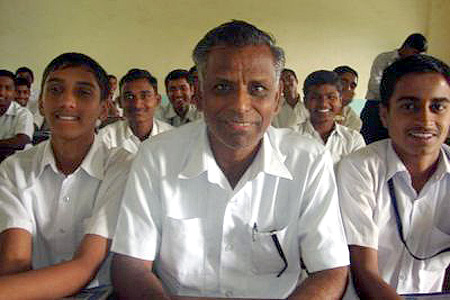
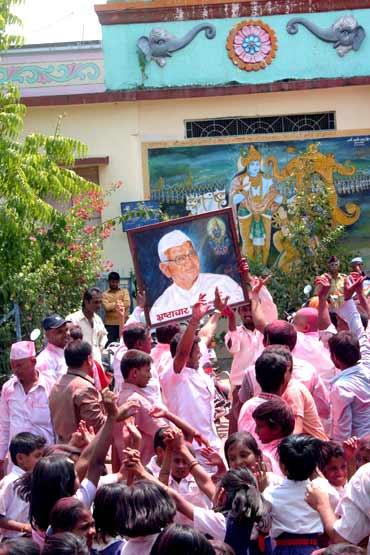
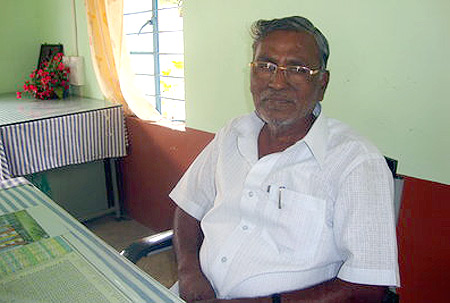
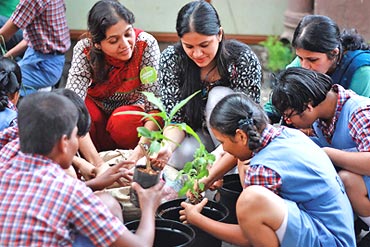
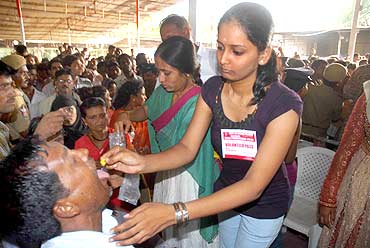
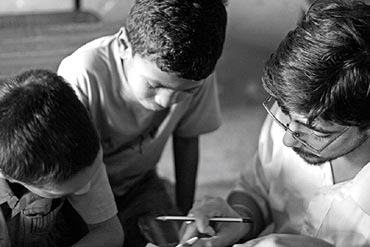

Comment
article